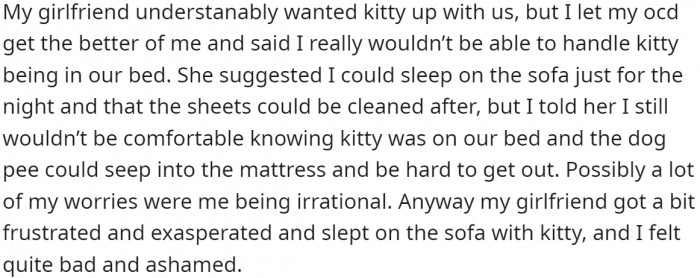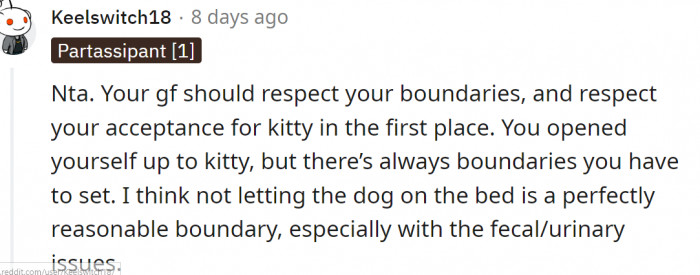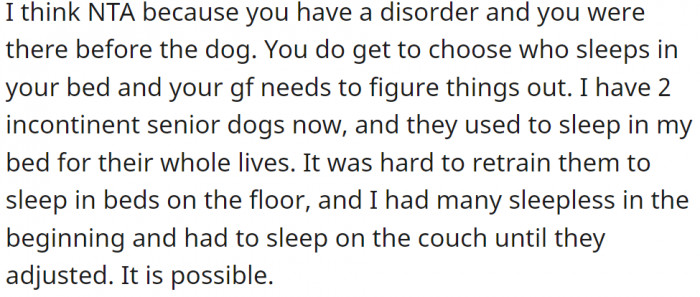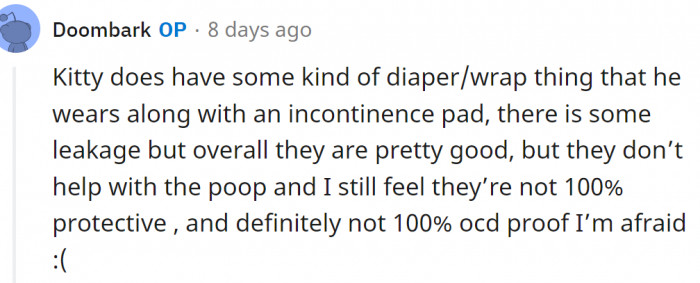Redditor Won't Allow His GF's Elderly Dog Into Bed Because He Has Frequent Accidents, GF Not Happy About It
OP (33m) and his girlfriend (31f) have been together for just over three years, and recently OP's girlfriend's old family dog, a fourteen-year-old springer spaniel, has come to live out what could be his final months in their house.
His girlfriend has many fond memories of the dog since he was a pup when she was living with her parents and loves him very much. However, due to his age, he needs extra care, so she offered for him to be taken care of by them.
OP has OCD, which makes him anticipate problems with having a dog in the house, especially one who is incontinent due to old age. Though his OCD has caused some difficult and uncomfortable situations, OP has still allowed the dog to stay in his home.
He requested that the dog not be allowed on one of the chairs so that he could sit on it without his brain going into overdrive and for the dog to sleep on a dog bed instead of their bed due to the potential for urine and fecal accidents. However, the dog was restless one night and looked at them, presumably because he wanted to come onto their bed.
OP's girlfriend understandably wanted Kitty to sleep with them, but OP's OCD got the better of him, and he said he would not be able to handle Kitty being in their bed. She suggested that OP could sleep on the sofa for the night and that the sheets could be cleaned afterward, but OP still felt uncomfortable knowing Kitty was on the bed and that the dog pee could seep into the mattress and be hard to get out.
OP's worries may have been irrational. As a result, his girlfriend ended up sleeping on the sofa with Kitty, and OP felt ashamed. In the morning, OP's girlfriend said she couldn't believe OP wouldn't let Kitty in bed with them, as Kitty was old and just wanted some comfort.
OP told her he understood, but Kitty did pee and poo frequently, and he did not want to deal with any damage the pee could do to the mattress or with having to clean the sheets. Additionally, OP admitted to the hassle that his OCD posed.
OP's girlfriend seemed put out with him and thought he could have made an exception, considering the circumstances.
OP asks:

OP (33m) and his girlfriend (31f) have been together for just over three years

OP's girlfriend's old family dog, a fourteen-year-old springer spaniel, has come to live out what could be his final months in their house.

Understanding Relationship Dynamics with Pets
Pets often play a significant role in our emotional lives, and their care can evoke strong feelings.
Dr. John Archer, a psychologist known for his research on human-animal relationships, suggests that interactions with pets can enhance emotional well-being but also provoke conflict.
When one partner feels responsible for the pet's care, it can lead to tension in relationships, especially if the other partner is less involved.
Understanding Boundaries in Relationships
The reluctance to allow a pet into personal spaces, like a bed, often reflects deeper issues of boundaries and comfort in relationships.
Research in relational psychology indicates that boundaries are essential for maintaining emotional safety and security in intimate relationships.
When one partner feels uncomfortable with certain behaviors, it's crucial to address these feelings openly and constructively.
OP agreed

He requested not to let the dog on one of the chairs so that he could sit on it without his brain going into overdrive

There were frequent accidents

In this case, the reluctance to share space with the girlfriend's elderly dog may reflect deeper concerns about responsibility and boundaries.
Research in the Journal of Applied Animal Welfare Science indicates that pet ownership can sometimes create strain in relationships, particularly when partners have differing expectations about care and involvement.
This issue highlights the need for clear communication about responsibilities and preferences.
Moreover, this situation highlights the complexities of emotional attachment to pets.
Studies have shown that pets often serve as emotional anchors for individuals, and any perceived threat to this bond can elicit strong emotional responses.
Understanding this dynamic can help partners navigate their feelings and find common ground in their pet-related decisions.
The dog was restless one night and looked at them, presumably because he wanted to come onto their bed

His GF was angry

OP has offered the following explanation for why he thinks he might be the asshole:

Navigating Relationship Conflicts
Conflict resolution is essential in maintaining healthy relationships, especially when it involves shared responsibilities.
Experts advocate for using 'I' statements to express feelings without assigning blame, which can foster more constructive conversations.
By approaching discussions with empathy, couples can navigate disagreements more effectively.
The Importance of Empathy in Decision-Making
Empathy plays a vital role in making decisions that involve shared responsibilities, especially regarding pets.
Research suggests that individuals who cultivate empathy are more likely to consider their partner's feelings and needs, leading to healthier relational dynamics.
Encouraging open discussions about feelings surrounding pets can enhance mutual understanding and foster compromise.
This Redditor thinks not letting the dog on the bed is a perfectly reasonable boundary, especially with the fecal/urinary issues.

Suggesting OP sleeps on the couch...

These are good questions:

It's also important to acknowledge the emotional attachments individuals have to their pets.
Research shows that attachment to pets can be profound and significantly impact relationship dynamics.
Understanding each other's feelings toward pets can foster empathy and reduce tensions.
Additionally, the concept of compromise is crucial in maintaining harmony in relationships.
Psychologists emphasize that finding a middle ground is essential for navigating differences in preferences, particularly regarding shared responsibilities.
Creating an environment where both partners feel heard and validated can lead to more effective solutions.
OP has a disorder and was there before the dog

Doggy diapers could work

OP replied:

Practical Approaches for Couples
Establishing clear roles and responsibilities can help couples manage pet care more effectively.
Creating a shared calendar for pet-related tasks can enhance communication and reduce misunderstandings.
Research indicates that structured approaches to shared responsibilities can lead to improved relationship satisfaction.
Managing Expectations and Reality
It's also important to acknowledge that expectations play a significant role in relationship dynamics.
Research indicates that mismatched expectations can lead to frustration and conflict, particularly in pet ownership.
Having clear discussions about boundaries, responsibilities, and potential compromises can help align expectations and reduce misunderstandings.
Taking care of elderly dogs brings many challenges. It is crucial to provide your elderly dog with as much love and attention as possible.
Showing them patience and understanding while providing them with a comfortable, safe environment can significantly improve their quality of life. We hope OP will find a way to make things work.
Finally, addressing the emotional aspects of pet ownership, including anxiety around accidents, is crucial for fostering understanding.
Individuals may need to explore their feelings about pets and how they impact their relationship dynamics.
Encouraging self-reflection and open communication can facilitate healthier interactions and strengthen relational bonds.
Psychological Analysis
This situation highlights the importance of boundaries and empathy in relationships, particularly regarding shared responsibilities like pet care.
Open communication is essential for navigating these complexities and fostering mutual understanding.
Analysis generated by AI
Analysis & Alternative Approaches
In summary, navigating pet ownership within relationships requires understanding boundaries, empathy, and effective communication.
According to research in relational psychology, open discussions about expectations and feelings can lead to healthier dynamics and mutual satisfaction.
By prioritizing these elements, partners can foster more harmonious relationships while accommodating each other’s needs.
Additionally, seeking couples counseling can provide a safe space to address underlying issues.
Studies show that couples who engage in therapy often experience improved communication and emotional connection.
By working with a professional, couples can learn to navigate their differences constructively.
Analysis & Alternative Approaches
The dynamics of shared pet ownership can significantly impact relationship satisfaction and emotional well-being.
As highlighted in psychological studies, clear communication and understanding are crucial for navigating these challenges.
With the right strategies and support, couples can foster healthier relationships with each other and their pets.



